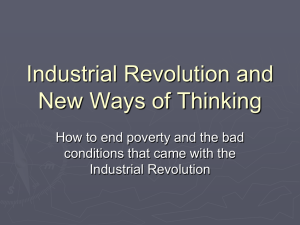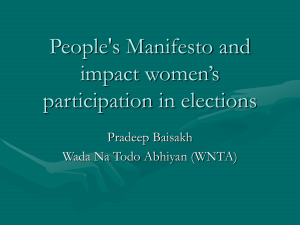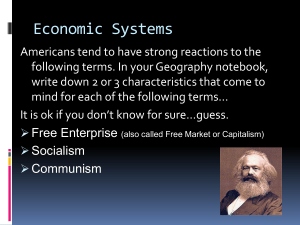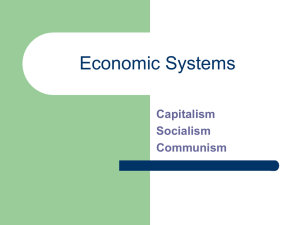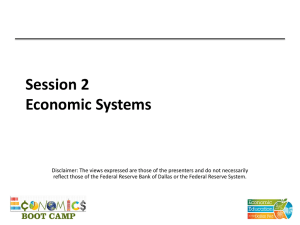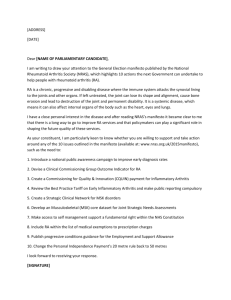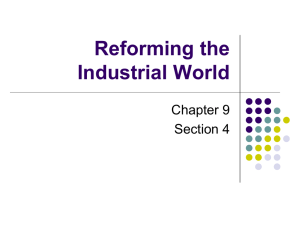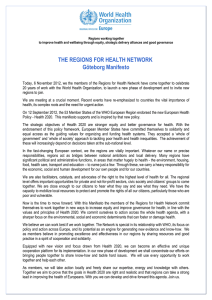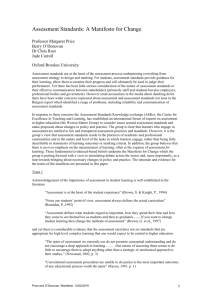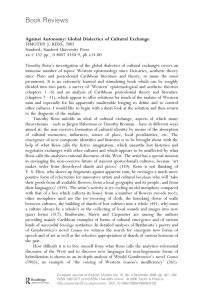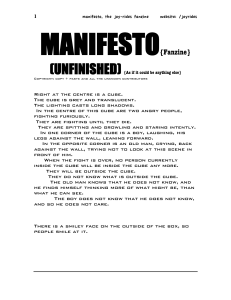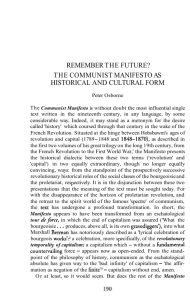Frédéric Vandenberghe: Notes on an Anti
advertisement
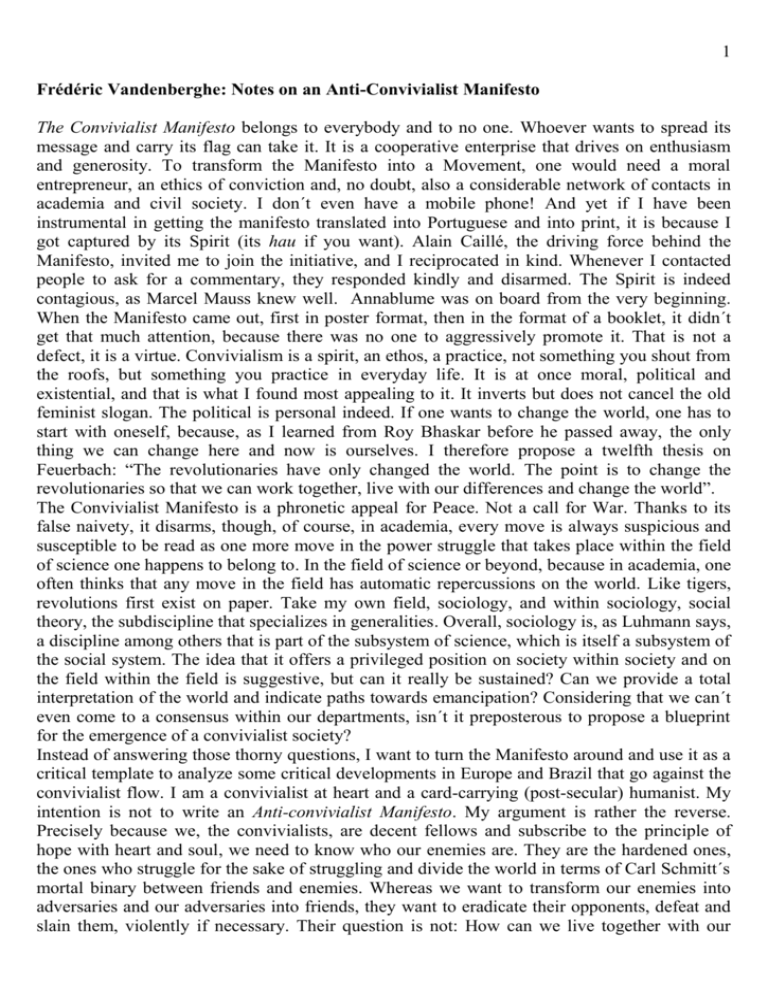
1 Frédéric Vandenberghe: Notes on an Anti-Convivialist Manifesto The Convivialist Manifesto belongs to everybody and to no one. Whoever wants to spread its message and carry its flag can take it. It is a cooperative enterprise that drives on enthusiasm and generosity. To transform the Manifesto into a Movement, one would need a moral entrepreneur, an ethics of conviction and, no doubt, also a considerable network of contacts in academia and civil society. I don´t even have a mobile phone! And yet if I have been instrumental in getting the manifesto translated into Portuguese and into print, it is because I got captured by its Spirit (its hau if you want). Alain Caillé, the driving force behind the Manifesto, invited me to join the initiative, and I reciprocated in kind. Whenever I contacted people to ask for a commentary, they responded kindly and disarmed. The Spirit is indeed contagious, as Marcel Mauss knew well. Annablume was on board from the very beginning. When the Manifesto came out, first in poster format, then in the format of a booklet, it didn´t get that much attention, because there was no one to aggressively promote it. That is not a defect, it is a virtue. Convivialism is a spirit, an ethos, a practice, not something you shout from the roofs, but something you practice in everyday life. It is at once moral, political and existential, and that is what I found most appealing to it. It inverts but does not cancel the old feminist slogan. The political is personal indeed. If one wants to change the world, one has to start with oneself, because, as I learned from Roy Bhaskar before he passed away, the only thing we can change here and now is ourselves. I therefore propose a twelfth thesis on Feuerbach: “The revolutionaries have only changed the world. The point is to change the revolutionaries so that we can work together, live with our differences and change the world”. The Convivialist Manifesto is a phronetic appeal for Peace. Not a call for War. Thanks to its false naivety, it disarms, though, of course, in academia, every move is always suspicious and susceptible to be read as one more move in the power struggle that takes place within the field of science one happens to belong to. In the field of science or beyond, because in academia, one often thinks that any move in the field has automatic repercussions on the world. Like tigers, revolutions first exist on paper. Take my own field, sociology, and within sociology, social theory, the subdiscipline that specializes in generalities. Overall, sociology is, as Luhmann says, a discipline among others that is part of the subsystem of science, which is itself a subsystem of the social system. The idea that it offers a privileged position on society within society and on the field within the field is suggestive, but can it really be sustained? Can we provide a total interpretation of the world and indicate paths towards emancipation? Considering that we can´t even come to a consensus within our departments, isn´t it preposterous to propose a blueprint for the emergence of a convivialist society? Instead of answering those thorny questions, I want to turn the Manifesto around and use it as a critical template to analyze some critical developments in Europe and Brazil that go against the convivialist flow. I am a convivialist at heart and a card-carrying (post-secular) humanist. My intention is not to write an Anti-convivialist Manifesto. My argument is rather the reverse. Precisely because we, the convivialists, are decent fellows and subscribe to the principle of hope with heart and soul, we need to know who our enemies are. They are the hardened ones, the ones who struggle for the sake of struggling and divide the world in terms of Carl Schmitt´s mortal binary between friends and enemies. Whereas we want to transform our enemies into adversaries and our adversaries into friends, they want to eradicate their opponents, defeat and slain them, violently if necessary. Their question is not: How can we live together with our 2 differences without massacring each other, but rather the reverse: How can we defeat our enemies and realize the highest degree of unity and intensity? As a platform of good will for the coming century, convivialism conceives of itself as a synthetic ideology that incorporates the best of liberalism, socialism, communism and anarchism into a new, uplifting vision of “the good life with and for others in just institutions”, as Ricoeur said (though, thinking about it, he really should have added “in a sustainable environment”). As a reconstructive utopia for a world on the brink of self-destruction, convivialism is the dream that spurs humanity to wake up from its nightmare. It is said to be implicit, or as the young Hegelians would phrase it, “immanent”, to the practices of the new, newer and newest social movements of moral protest that contest the cynicism, indecency, corruption and hubris of the powerful and the ultra-rich. Anti-convivialism is its opposite. It is the ideology that is implicit in all reactionary, xenophobic, homophobic, populist movements in the world that reject difference and want to turn back the clock to the winter hour of the 1950´s. Before 1968, when the workers, the blacks, the women, the homosexuals, the subaltern knew their place and kept their mouth. Anticonvivialism combines the worst of liberalism, socialism, communism and anarchism into a heady brew of violent struggle against the class struggle, ethnic unrest and countercultural contestation of order. Although the discourse of reaction has hardly changed since the French revolution, it is spelled out differently in the West (the Center) and the South (the periphery and the semi-periphery, with the emergent countries quickly becoming ‘pericentric’). Worse than liberalism is Neo-Liberalism. It is the specter that haunts the Left. It started as an ideology of small shopkeepers, like Margaret Thatcher, and wild west cowboys, like Ronald Reagan, that promote free enterprise and abhor the State. It ended up instrumentalising the State to defend and implement the interests of big transnational corporations and banks against the interests of the majority. Because of the massive change in the correlation of power, the neocorporate arrangement of post-war social democracy was undone. With the fall of the Berlin Wall, capitalism went global and wild. Without any counterforces, financial capitalism expanded, submitted the real economy to its command and went ballistic. The result of unfettered growth and greed was a financial crisis of 2007-2008, which started in the USA as a ‘subprime crisis’ and morphed into a fiscal crisis of the State when, two years later, it arrived in Europe. At first, the crisis seemed to spell the end of neo-liberalism, but eventually it came back with a vengeance as politics of austerity. What Thatcher hadn´t succeeded in dismantling in 20 years is now being undone in record time. At the time of writing, it is not even clear if the EU will survive (Grexit? Brexit?). In Latin America, capitalism is even more brutal, because when the arrogance of money fuses with the violence of colonialism, slavery and military dictatorship, the disciplinary power of the past continues to be used against those who have no rights and are therefore excluded from common humanity, while those who have rights, but no obligations, shamelessly profit from the fact that they can exploit without having the legitimate and justify themselves. Quem pode pode. And as long as one is not caught in flagrante, there’s no need to show restraint or to have moral qualms. In any case, the press is so securely controlled by a handful of families who defend, come what may, their illiberal practices and their neo-liberal interests in the name of freedom that one might as well nationalize it in the name of the people. Worse than socialism is National Socialism. Since the 1980´s, the manual workers have increasingly given up on syndicalism. They stopped voting for the Communist Party and started 3 to vote for the extreme right. The Front National in France and the Austrian Freedom Party were at the forefront, but with the exception of Germany, all European countries have seen a surge in popular and populist parties on the far right. The last European elections were disastrous. The Front national of Marine Le pen and UKIP of Michael Farage became the biggest parties on both sides of the Channel. The extreme right has changed its enemies. It´s no longer the Jews, or at least not in the first place, now it´s the Muslims, the Blacks, the foreigners who have become their main targets. And the European Union too. The rightist parties want to bring back the nation-state. Unlike the extreme right of the 80´s and 90´s, the contemporary far right has given up on the free market and globalization. They want a strong welfare state, but, of course, only for the nationals, and definitely not for the foreigners and welfare tourists. In Latin America, like in Europe till the early eighties, the hegemony comes from the Left. Its socialism is overwhelmingly nationalist and developmentalist. In Brazil, the PT has now been solidly in place since 2002. Like an old oil tanker, it has slowly changed the course of history. Extreme poverty has been almost eradicated (Fome zero), but inequality remains shockingly high. Until recently, the PT has succeeded in coopting most progressive movements (like MST, feminist and afro-movements, etc.) under its wings through massive distribution of money (NGO’s) and power (in ministries and secretaries). Like an old tanker, it’s becoming rusty and taking water (serial scandals do mensalao, do petrolao, etc.). If Lula comes back in 2017, the PT will go the same way as the Mexican Partido revolucionario institucional (PRI) – in power, for sure, controlling the whole apparatus, but without credit (but as far as I’m concerned, anything is better than the Brazilian right). Worse than communism is Stalinism. Stalinism with a human face, dogmatism of a far left that continuously rehearses the same lines: declining rate of profit, class struggle, final collapse of the system, revolution. When historical materialism is reaffirmed without thinking, it falls back into, shall I say it?, “pre-historical materialism”. Plechanov, Luxemburg, Lukács, Lenin, Trotsky, Pannekoek, Mao, Marcuse, even Saint Paul, all these dinosaurs can somehow be resurrected these days with a dose of post-colonialism: world-systems theory and coloniality of knowledge, post-structuralism and subaltern studies, Frankfurt School and Mariátegui, even Foucault and Shariati can be combined, provided that indignation finds an outlet. To justify one’s radicalism, one only has to paint black on grey and close the system into an iron cage without windows and without escape. The exercise is aporetic: Total domination, total alienation, permanent state of exception, only the intellectual who describes the state of exception is able to escape his or her own diagnosis. While in Europe, the Marxist-Hegelian philosophy of history collapsed some time in the 1980’s, in Latin America, one can still find unreformed barbudos waiting for the Proletariat (or one of its stand-ins: the workers, the landless peasants, the Social Forum, etc.). To avoid all misunderstandings: In the region anti-communism is even worse than the perversion and parody of communism (bolivarismo, chavismo, etc.). Coup d’Etat, golpe dentro do golpe, military dictatorship and systematic torture, all in the name of anti-communism. The fact that torture has now become global does no more justify the struggle against communism than the war against terror. One might as well fight a war against war. Worse than anarchism is nihilism. Nietzsche famously asked: “What is nihilism?” and answered: “The end is missing. There is no answer to the question: Why?” Nihilism is when there’s no future and one would rather destroy than construct. Europe knows that it has no 4 future. There’s no way back and there’s no way forward. The political horizon is blocked for the next 15 to 20 years. Don’t expect anything positive from the Museum! In Brazil, anarchism is alive and kicking. Too much Bakounin, too little Kropotkin, however. The Jornadas of June were exhilarating, but also demobilizing. The spectacle of violence took over and it took us all a while to realize that black blockism is not a technique of social movements, but a technique of defacement used during protests – to charge and discharge, defend and attack, to protect and project against the police. I participated to so many protests in downtown Rio and every time I returned with tears in the eyes (and without gasmask or vinegar). Together, the black blocks, the military police and the press form a triangle of death. Although the sharpest analyses of the present state come from the intelligentsia of the multitude (the doutorandos and mestrandos I meet on the streets and then later at the university), I am not entirely satisfied with the narrow focus on protests. The protests are like the foam on the waves. What matters are the oceans themselves. Unfortunately, they are dying. Underneath the visibility of protests, there are thousands of subterranean projects of co-creative destruction and co-constructive transformation. The internet offers a window on them. The whole question is how we can transform the lines of death into lines of flight, the forces of destruction into forms of construction, and make the movement move again. We have the answer. Convivialism. It’s an answer that is at once constructive and convivial, existential and social, political and experimental. It is the energy that operates at all levels of society that transforms, as Gramsci would say, the hearts and minds of all and everyone, not just in the streets and the squares, but also in the communities, the schools and in the workplace.
